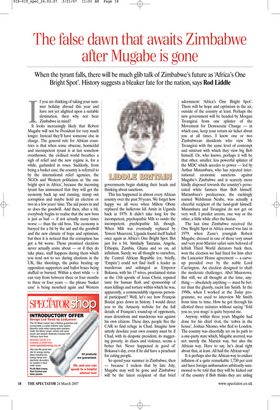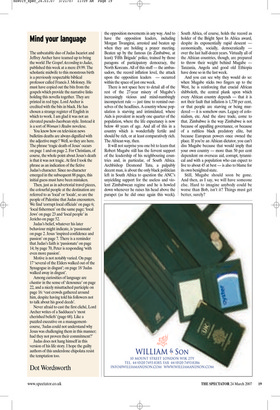The false dawn that awaits Zimbabwe after Mugabe is gone
When the tyrant falls, there will be much glib talk of Zimbabwe’s future as ‘Africa’s One Bright Spot’. History suggests a bleaker fate for the nation, says Rod Liddle If you are thinking of taking your summer holiday abroad this year and have not yet alighted upon a suitable destination, then why not bear Zimbabwe in mind? It looks increasingly likely that Robert Mugabe will not be President for very much longer. Instead they’ll have someone else in charge. The general rule for African countries is that when some obscene, homicidal and incompetent tyrant is at last somehow overthrown, the civilised world breathes a sigh of relief and the new regime is, for a while, garlanded in roses. Suddenly, from being a basket case, the country is referred to by the international relief agencies, the NGOs and Western politicians as ‘the one bright spot in Africa’, because the incoming tyrant has announced that they will get the economy back up and running, stamp out corruption and maybe hold an election or two in a few years’ time. The aid pours in and so does the goodwill. And then, after a bit, everybody begins to realise that the new boss is just as bad — if not actually many times worse — than the old boss. The economy is buoyed for a bit by the aid and the goodwill and the new climate of hope and optimism, but then it is noticed that the corruption has got a bit worse. Those promised elections never actually come about — or if they do take place, stuff happens during them which you tend not to see during elections in the UK, like shootings, the police beating up opposition supporters and ballot boxes being stuffed or burned. Within a short while — it can vary from between three or four months to three or four years — the phrase ‘basket case’ is being mouthed again and Western governments begin shaking their heads and thinking about sanctions.
This has happened in almost every African country over the past 50 years. We forget how happy we all were when Milton Obote replaced the ludicrous Idi Amin in Uganda back in 1979. It didn’t take long for the incompetent, psychopathic Milt to outdo the incompetent, psychopathic Idi, though. When Milt was eventually replaced by Yoweri Museveni, Uganda found itself hailed once again as Africa’s One Bright Spot. But just for a bit. Similarly Tanzania, Angola, Ethiopia, Zambia, Ghana and so on, ad infinitum. Surely, we all thought to ourselves, the Central African Republic (or, briefly, ‘Empire’) could not find itself a leader as murderous and unhinged as Emperor Bokassa, with his 17 wives, proclaimed status as the 13th apostle of Jesus Christ, reputed taste for human flesh and sponsorship of mass killings and torture within which he was, apparently, a commendably vigorous personal participant? Well, let’s see how François Bozizé goes down in history. I would direct you to the Amnesty website for the full details of François’s round-up of opponents, mass detentions and murderous war against his own citizens. These days, people flee the CAR to find refuge in Chad. Imagine how utterly desolate your own country must be if Chad, with its despotic president, its staggering poverty, its chaos and violence, seems a better bet. Never happened in good ol’ Bokassa’s day, even if he did have a penchant for eating people.
So spend your summer in Zimbabwe, then — because I reckon that by late July, Mugabe may well be gone and Zimbabwe will be the latest recipient of that brief adornment: ‘Africa’s One Bright Spot’. There will be hope and optimism in the air, outside of the country at least. Perhaps the new government will be headed by Morgan Tsvangirai from one splinter of the Movement for Democratic Change — in which case, keep your return air ticket about you at all times. I know one or two Zimbabwean dissidents who view Mr Tsvangirai with the same level of contempt and mistrust with which they view big Bob himself. Or, who knows, perhaps it will be that other, smaller, less powerful splinter of the MDC which accedes to power — led by Arthur Mutambara, who has rejected international economic sanctions against Mugabe’s Zimbabwe and is scarcely more kindly disposed towards the country’s persecuted white farmers than Bob himself. Mutambara’s predecessor, the excitingly named Welshman Ncube, was actually a cheerful recipient of the land-grab himself. Mutambara and Tsvangirai do not get on very well. I predict arrests, one way or the other, a little while after the hiatus.
The last time Zimbabwe received the One Bright Spot in Africa award was late in 1979, when Zanu’s youngish Robert Mugabe, dressed in one of those very smart and very post-Marxist safari suits beloved of leftish Third World dictators back then, won the election we had fixed for him after the Lancaster House agreement — a carveup presided over by the noble Lord Carrington. An election designed to shaft the moderate challenger, Abel Muzorewa. But still, we all thought at the time, anything — absolutely anything — must be better than the ghastly, racist Ian Smith. In the 1990s, when I worked at the Today programme, we used to interview Mr Smith from time to time. How he got through his allotted three minutes without saying ‘Told you so, you mugs’ is quite beyond me.
Anyway, within three years Mugabe had done for his chief rival, the ‘cobra in the house’, Joshua Nkomo, who fled to London. The country was cheerfully set on its path to a one-party state which, Mugabe averred, was not merely the Marxist way, but also the African way. Have to say, he’s dead right about that, at least. All hail the African way!
It is perhaps also the African way to endure inflation of a quite remarkable 1,730 per cent and have foreign ambassadors arbitrarily summoned to be told that they will be kicked out of the country if Bob thinks they are aiding the opposition movements in any way. And to have the opposition leaders, including Morgan Tsvangirai, arrested and beaten up when they are holding a prayer meeting. Beaten up by the famous (in Zimbabwe, at least) ‘Fifth Brigade’ police, trained by those paragons of participatory democracy, the North Koreans. All of this stuff — the ambassadors, the record inflation level, the attack upon the opposition leaders — occurred within the space of just one week.
There is not space here to detail all of the rest of the 27-year misery of Mugabe’s increasingly vicious and mind-numbingly incompetent rule — just time to remind ourselves of the headlines. A country whose population is starving and intimidated, where Aids is prevalent in nearly one quarter of the population, where the life expectancy is now below 40 years of age. And all of this in a country which is wonderfully fertile and should be rich, or at least comparatively rich. The African way, then.
It will not surprise you one bit to learn that Robert Mugabe still has the fervent support of the leadership of his neighbouring countries and, in particular, of South Africa. Archbishop Desmond Tutu, a palpably decent man, is about the only black politician left in South Africa to question the ANC’s unyielding support for the useless and violent Zimbabwean regime and he is howled down whenever he raises his head above the parapet (as he did once again this week). South Africa, of course, holds the record as holder of the Bright Spot In Africa award, despite its exponentially rapid descent economically, socially, democratically over the last half-dozen years. Virtually all of the African countries, though, are prepared to throw their weight behind Mugabe Tanzania, Angola and good old Ethiopia have done so in the last week.
And you can see why they would do so: when Mugabe sticks two fingers up to the West, he is reinforcing that crucial African shibboleth, the central plank upon which every African country depends — that it is not their fault that inflation is 1,730 per cent, or that people are starving or being murdered — it is somehow ours. Legacy of colonialism, etc. And the slave trade, come to that. Zimbabwe is the way Zimbabwe is not because of appalling governance, or because of a ruthless black predatory elite, but because European powers once owned the place. If you’re an African dictator, you can’t diss Mugabe because that would imply that your own country — more than 50 per cent dependent on overseas aid, corrupt, tyrannical and with a population who can expect to live to about 45 at best — is also to blame for its own benighted state.
Still, Mugabe should soon be gone. And then, as I say, we will have someone else. Hard to imagine anybody could be worse than Bob, isn’t it? Things must get better, surely?



















































































 Previous page
Previous page